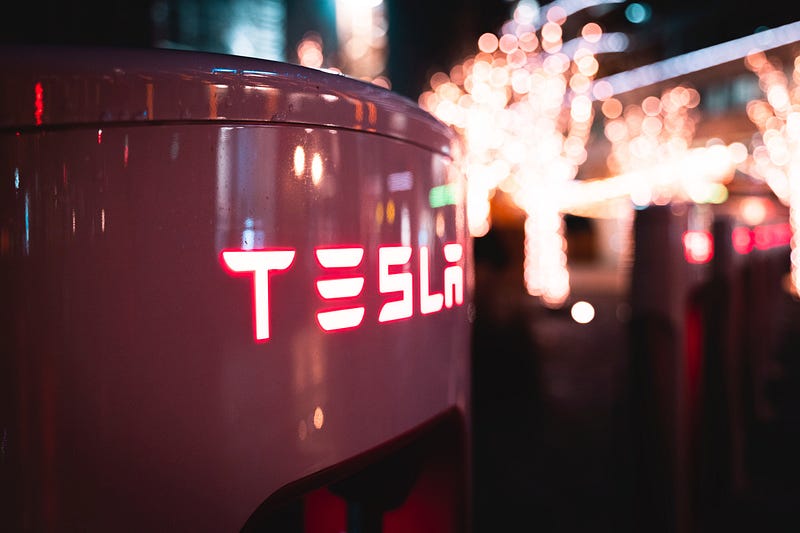Tesla's Innovative Approach: Disrupting the Automotive Industry
Written on
Chapter 1: The Distinctive Tesla Model
In a recent interview, Elon Musk made bold claims regarding the future of traditional automakers, suggesting they might soon face significant challenges. In just eight minutes, he critiques various sectors, including automotive manufacturers, AI firms, and insurance companies.

Photo by Paul Steuber on Unsplash
During a discussion about Tesla's impressive valuation, Musk emphasized that Tesla operates differently compared to conventional car manufacturers. He likened Tesla to a conglomerate of several companies, which prompted Chamath Palihapitiya to request a deeper explanation of how Tesla's multifaceted approach sets it apart.
Over the span of eight minutes, Musk delineates the shortcomings of traditional automotive practices and highlights Tesla's superior strategies, showcasing the advantages it holds across multiple business domains.
Section 1.1: Revolutionizing Car Manufacturing
Musk's vision for automobile production starkly contrasts with that of traditional manufacturers. When unveiling GigaAustin, he described a facility designed to receive raw materials and output finished vehicles efficiently, emphasizing the goal of in-house production of as many components as possible.
Conventional carmakers typically rely on external suppliers for parts assembly. While some manage to produce their engines, many do not. They focus on supply chain management and then pass finished vehicles to independent dealerships for sales and service.
In contrast, Tesla's vertical integration allows it to produce nearly every component internally, including battery packs, power electronics, and even seats. This strategy enables Tesla to directly manage sales and service, accumulating valuable data that enhances its offerings and speeds up operations.
Section 1.2: Energy Solutions and Supercharging
Legacy automakers often outsource energy production and distribution. For gasoline vehicles, it would seem absurd for manufacturers to handle extraction, refining, and transportation. The same applies to electric vehicles, as they rely on third-party charging networks.
Tesla, however, takes a different route, providing its customers with direct access to energy solutions. The company designs, manufactures, and operates its supercharger network, which boasts over 30,000 charging stations globally. Furthermore, Tesla generates a portion of its energy through solar panels and energy storage systems.
Tesla has recognized its competitive edge early on and is now preparing to open its network to all-electric vehicles, thereby collecting data for further improvements.
Chapter 2: Software and Autonomy
In this video, Elon Musk discusses how traditional carmakers face greater financial risks than they realize, while Tesla innovates in ways that could reshape the industry landscape.
Section 2.1: The Software Advantage
Musk asserts that Tesla is equally a software company as it is a hardware one. The company develops its software in-house, including everything from vehicle operation to charging systems. This commitment to proprietary technology extends to their refusal to adopt third-party systems like Apple CarPlay or Android Auto.
Once Tesla achieves a critical mass of vehicles sold, it plans to launch an app store, allowing both in-house and third-party developers to create software for the vehicles, ranging from driving assistance to entertainment.
Section 2.2: Advancements in Autopilot and AI
Tesla has assembled a top-tier AI and autopilot engineering team, striving to develop its Full Self Driving (FSD) functionality, which promises to revolutionize transportation. According to Musk, the FSD beta can often navigate the complex traffic of the Bay Area with minimal intervention.
With plans to expand FSD to a million vehicles by year-end, Tesla's autonomous driving technology is poised to lead the market. As regulatory processes unfold, the functionality will gradually enhance, paving the way for fully autonomous systems.
In this video, Trump discusses the implications for the auto industry and how Tesla, under Musk's leadership, is positioned to tackle emerging challenges.
Section 2.3: Dojo and AI as a Service
While developing their AI capabilities, Tesla faced limitations with their existing chips, prompting the need for a tailored solution. The company is now focused on building new chips and architecture, leading to the creation of Dojo.
Showcased during AI Day, Dojo is designed to process vast amounts of video data collected from Tesla's global fleet, enhancing the models that will power autonomous driving features.
Section 2.4: The Future of Insurance
Tesla is also venturing into the insurance sector, providing a more cost-effective alternative to traditional insurance companies. Instead of relying on generalized statistics, Tesla uses real-time data from drivers and vehicles to assess risks accurately.
This innovative approach results in lower premiums for safe drivers, as assessed by Tesla's Safety Score, which evaluates driving habits based on various safety metrics. As a result, Tesla insurance customers report substantial savings compared to legacy insurers.
Conclusion: A Comprehensive Ecosystem
Elon Musk's insights illustrate how Tesla is cultivating a self-sustaining ecosystem, offering an array of products and services to its customers. By enabling cost savings on fuel, solar energy, and insurance, Tesla is not just enhancing customer experience but positioning itself to become a dominant force in an industry undergoing rapid transformation.
If Tesla executes its vision effectively, it could emerge as the most valuable company globally, leaving traditional competitors at risk of obsolescence, reminiscent of historical shifts in various industries.
If you enjoyed this discussion, you may find these articles intriguing:
- Car Sales Are Dropping Fast — And Not Because of the Semiconductor Shortage
- Supply chain issues have hampered automakers, but the dreaded Osborne Effect is a much bigger drag on the industry.